IRA Investing
Best Way to Invest in Bitcoin: The Ultimate Guide
Yearning to dive into Bitcoin investing? Discover the ultimate guide for expert strategies and tips to optimize your investments.

To invest in Bitcoin effectively, start by securing a reliable digital wallet and staying informed about market trends. Utilize fractional purchases for flexibility and consider Bitcoin ETFs for regulated exposure. Implement strong security measures like two-factor authentication and regular updates. Diversifying your crypto portfolio across various assets and sectors can manage risks and optimize growth opportunities. Be aware of Bitcoin's high volatility and manage risks through strategic allocation. Understanding tax implications and the long-term outlook can guide your investment decisions. A well-rounded understanding of these aspects is essential for a successful Bitcoin investment strategy and wealth accumulation. Further insights into Bitcoin investment strategies await.
Key Takeaways
- Acquire a secure digital wallet for Bitcoin storage.
- Stay informed on market trends for strategic decisions.
- Consider Bitcoin ETFs for regulated exposure.
- Implement strong security measures for protection.
- Diversify your portfolio across cryptocurrencies for risk management.
Getting Started With Bitcoin Investment

To begin your journey into Bitcoin investment, acquiring a secure digital wallet is the essential first step. A digital wallet is a key tool for securely storing Bitcoin and other cryptocurrencies, providing a safe haven for your digital assets. When venturing into the cryptocurrency market, safeguarding your investments against hacking risks is paramount, making the choice of a reliable digital wallet vital.
Investing in Bitcoin offers opportunities for both small and large investors, with fractional purchases allowing for flexibility in the amount of capital allocated. Direct ownership of Bitcoin grants full control over your digital assets, enabling quick liquidity for buying and selling as desired. Additionally, Bitcoin ETFs provide regulated exposure to the crypto market, with spot ETFs mirroring current market prices and futures ETFs speculating on future price movements through contracts.
Understanding the role of digital wallets, the benefits of direct ownership, and the potential of ETFs can help navigate the complexities of Bitcoin investment effectively.
Understanding Cryptocurrency Market Dynamics

Mastering the intricate landscape of cryptocurrency investments demands a deep understanding of the dynamic forces that influence the market, particularly highlighting the interplay of factors such as supply and demand, market sentiment, regulatory changes, and technological advancements.
Market volatility is a common feature in the cryptocurrency space, with prices often experiencing significant fluctuations within short periods. Understanding market cycles, such as bull and bear markets, can assist investors in making informed decisions and managing price trends effectively.
Cryptocurrency market dynamics can be influenced by external events like macroeconomic trends, geopolitical tensions, and global regulatory changes. To stay well-informed about market dynamics, investors should rely on reliable sources, analysis tools, and expert insights to make strategic investment choices.
Risks and Volatility in Bitcoin Investing

Bitcoin investing comes with inherent risks and high volatility, as evidenced by the cryptocurrency's significant price fluctuations. Factors such as uncertain regulatory environments and the potential for market manipulation further add to the risks involved in investing in Bitcoin.
Understanding these risks and being prepared for sudden changes in price are vital for individuals considering Bitcoin as part of their investment portfolio.
High Price Fluctuations
Bitcoin's vital price swings create a challenging environment for investors seeking stability in their portfolios. The high volatility in Bitcoin poses significant risks, necessitating investors to carefully manage their investments.
Fractional purchases of Bitcoin allow investors of all sizes to participate in the market, reducing the barrier to entry for those with limited capital. Understanding the factors that drive price fluctuations in Bitcoin is essential for making informed investment decisions.
Despite the risks involved, Bitcoin's liquidity enables easy buying and selling, attracting a diverse range of investors. This liquidity guarantees that investors can quickly enter or exit positions as needed, contributing to the popularity of Bitcoin as an investment asset.
Uncertain Regulatory Environment
Exploring the dynamic landscape of Bitcoin investments demands a sharp awareness of the unpredictable regulatory environment that can greatly influence both risks and volatility associated with this digital asset. The uncertain regulatory environment, characterized by regulatory uncertainty and government actions, plays a significant role in shaping the legal risks for investors. The lack of clear regulations in many jurisdictions adds to the complexity, creating challenges for those maneuvering through the decentralized nature of Bitcoin. This lack of regulatory clarity also impacts trading activities, leading to potential fluctuations in value based on evolving legal interpretations and enforcement actions. To illustrate the impact of regulatory uncertainty, consider the following table:
| Regulatory Environment | Impact on Bitcoin Investments |
|---|---|
| Uncertain regulations | Increased risks and volatility |
| Lack of clarity | Legal uncertainties for investors |
| Government actions | Market response and price shifts |
Market Manipulation Risks
Amidst the decentralized and unregulated landscape of digital assets, market manipulation risks pose significant challenges for investors traversing the volatile world of cryptocurrency investments. Cryptocurrency, including Bitcoin, is particularly vulnerable to various forms of market manipulation due to its decentralized nature and lack of oversight.
Some common tactics used for price manipulation include pump and dump schemes, spoofing, and wash trading. Regulatory bodies such as the SEC have expressed concerns about the prevalence of market manipulation in the cryptocurrency space.
Investors should remain cautious of sudden and drastic price movements, as they could be indicative of potential market manipulation at play.
Diversifying Your Crypto Portfolio

Diversifying your crypto portfolio is a smart strategy that involves spreading your investments across different digital assets like Ethereum, Solana, and Binance Coin. By diversifying, you can manage risk more effectively and potentially capitalize on the growth of various cryptocurrencies.
Consider exploring portfolio allocation strategies and risk management techniques to make informed decisions when expanding your crypto holdings.
Portfolio Allocation Strategies
Crafting a well-thought-out portfolio allocation strategy in the cryptocurrency market involves strategically spreading investments across various digital assets to mitigate risk and optimize returns. Effective diversification can help balance exposure to different types of cryptocurrencies, offering a more stable investment approach in the volatile crypto market.
When considering portfolio allocation, it's imperative to diversify not only across various cryptocurrencies but also across different sectors within the crypto market to capture opportunities and minimize risk. Strategic allocation plays a significant role in enhancing overall performance and protecting against significant losses in any single asset.
- Diversify across different cryptocurrencies.
- Allocate investments across various sectors in the crypto market.
- Balance exposure to riskier assets like Bitcoin with more stable altcoins.
Risk Management Techniques
In the domain of cryptocurrency investing, a prudent approach to managing risk within your portfolio involves strategically diversifying your holdings across a spectrum of digital assets. Diversifying your crypto portfolio is a key financial strategy to mitigate risks associated with investing in cryptocurrencies.
By spreading your investments across different types of cryptocurrencies, such as established ones like Bitcoin and Ethereum, as well as promising altcoins, you can reduce the potential impact of price fluctuations on any single asset. This diversification not only helps in minimizing the likelihood of significant losses but also enables you to capture potential growth opportunities in various sectors of the cryptocurrency market.
Implementing effective risk management techniques like diversification is essential for building a resilient and balanced crypto portfolio.
Strategies for Managing Investment Risk

When evaluating the potential risks associated with Bitcoin investments, it is imperative to carefully consider various factors such as market volatility, investment time horizon, and personal risk tolerance.
To effectively manage investment risk when investing in crypto, consider the following strategies:
- Diversify: Spread your investment across different assets to reduce risk exposure in the cryptocurrency market.
- Utilize stop-loss orders: Automatically sell assets at preset price levels to limit potential losses and protect your investment capital.
- Stay informed about market trends: Keep abreast of news, regulatory developments, and market trends to make informed risk management decisions.
Leveraging Bitcoin ETFs for Investment

By considering the potential benefits of leveraging Bitcoin ETFs, investors can access regulated exposure to Bitcoin in a more diversified and structured manner.
Bitcoin ETFs are exchange-traded funds that offer a way to invest in Bitcoin through a brokerage account without needing to directly hold the cryptocurrency. There are two main types of Bitcoin ETFs: futures ETFs and spot ETFs. Futures ETFs speculate on future Bitcoin prices through contracts, while spot ETFs directly track current Bitcoin market prices for investors.
Pending spot ETF approvals could lead to greater diversification within the Bitcoin ETF market, potentially driving increased demand for Bitcoin among investors.
Investing in Bitcoin through ETFs can be a convenient way to add cryptocurrency exposure to a diversified portfolio, especially for those looking to navigate market conditions with a more traditional investment approach. By incorporating Bitcoin ETFs into their investment strategy, investors can gain access to the cryptocurrency market through a regulated and familiar investment vehicle.
Exploring Alternative Cryptocurrency Investment Options

Investors looking to broaden their cryptocurrency portfolio beyond Bitcoin have a range of alternative options to explore, such as Ethereum, Solana, and Binance Coin. Each altcoin presents unique features and growth potential that can complement a Bitcoin-centric strategy.
Diversifying With Altcoins
Exploring alternative cryptocurrency investment options involves delving into a domain beyond Bitcoin, where altcoins like Ethereum, Solana, and Binance Coin present diverse opportunities for investors looking to diversify their portfolios. Altcoins can play an essential role in helping investors diversify their cryptocurrency portfolios and tap into the potential growth and innovation within the evolving crypto space.
As the cryptocurrency market continues to expand, altcoins are reshaping the landscape, creating a more competitive market environment challenging Bitcoin's dominance. By considering altcoins alongside Bitcoin, investors can gain exposure to different projects, technologies, and use cases, broadening their investment horizons in the dynamic world of cryptocurrencies.
- Altcoins offer diverse investment opportunities beyond Bitcoin.
- Investing in altcoins can help diversify cryptocurrency portfolios.
- Altcoins contribute to the competitive and innovative nature of the evolving crypto space.
Risks and Rewards
For investors venturing into the realm of alternative cryptocurrency investments, understanding the associated risks and rewards is crucial in making informed decisions within the evolving crypto space. Altcoins, such as Ethereum and Solana, present investment opportunities beyond Bitcoin, offering diversification within the cryptocurrency market.
These alternative cryptocurrencies have unique features and use cases that can appeal to different types of investors seeking to explore the expanding landscape of digital assets. While the potential rewards of investing in altcoins can be enticing, recognizing the higher volatility and increased risk factors that come with these alternative investments is key.
Securing Your Bitcoin Assets

Securing Bitcoin assets is a critical aspect of safeguarding your investments in the digital currency domain. To protect your Bitcoin holdings effectively, consider the following strategies:
- Utilize hardware wallets: Store your Bitcoin offline in hardware wallets to enhance security measures and reduce the risk of online hacking.
- Implement strong passwords and two-factor authentication: Strengthen the protection of your Bitcoin assets by using complex passwords and enabling two-factor authentication on your accounts.
- Backup wallet details securely: Prepare for potential device failures or losses by securely backing up your wallet details in multiple locations to avoid losing access to your funds.
Additionally, be cautious when using third-party wallets managed by exchanges, as they may pose security risks. Regularly updating your security measures and staying vigilant for any suspicious activity can help you mitigate potential threats to your Bitcoin assets.
Tax Implications of Bitcoin Investment

Understanding the tax implications of investing in Bitcoin is essential for individuals maneuvering the financial landscape of digital assets. In Australia, the Australian Taxation Office (ATO) views Bitcoin as property, subjecting it to capital gains tax when sold or exchanged. Capital gains tax is determined by subtracting the cost base (purchase price) from the selling price of Bitcoin.
Holding Bitcoin for over 12 months may entitle investors to a 50% capital gains tax discount. Tax obligations related to Bitcoin transactions differ depending on factors like trading frequency and purpose (personal use or investment). To navigate the complexities of tax implications regarding Bitcoin investments, it is advisable to seek guidance from a tax professional or refer to the ATO guidelines.
Consulting with experts can provide tailored advice on reporting Bitcoin transactions accurately and ensuring compliance with Australian tax laws.
Long-Term Outlook on Bitcoin Investment

Exploring the changing terrain of Bitcoin investments involves contemplating the long-term outlook for potential growth and sustainability in the digital asset market. As investors assess the future prospects of Bitcoin, several key factors come into play:
- Limited Supply: Bitcoin's scarcity, with only 21 million coins ever to be mined, underpins its long-term value proposition.
- Institutional Adoption: The increasing interest and investment from institutional players signal a growing confidence in Bitcoin's longevity and potential for sustained growth.
- Mainstream Acceptance: With more widespread acceptance and integration into traditional financial systems, Bitcoin is moving towards becoming a more established asset class, further solidifying its position for long-term investment strategies.
Considering these factors alongside Bitcoin's historical performance and resilience, long-term investors may find that holding Bitcoin can offer a valuable addition to their investment portfolio, potentially yielding benefits irrespective of short-term market fluctuations.
Frequently Asked Questions
What Is the Best Way to Invest in Bitcoin?
When considering the best way to invest in Bitcoin, direct ownership is often recommended due to the control it offers over digital assets and the high liquidity for easy transactions. Fractional purchases cater to investors of varying sizes, while challenges like secure storage and hacking risks need to be considered.
Additionally, investing in Bitcoin through ETFs provides regulated exposure to the cryptocurrency market, with futures ETFs allowing speculation on future prices through contracts.
What Happens if You Invest $100 in Bitcoin Today?
If you invest $100 in Bitcoin today, you would own approximately 0.0015 BTC. Bitcoin's price volatility means the value of your investment could change rapidly, potentially growing or declining based on market conditions.
Monitoring your investment regularly and staying informed about Bitcoin's price movements is essential. Remember, 'Buy when there's blood in the streets.' This adage highlights the importance of patience and strategic decision-making in volatile markets like cryptocurrency.
Can You Make $100 a Day With Crypto?
Achieving daily profits of $100 with cryptocurrencies is feasible but comes with risks. Success depends on factors like market conditions, investment amount, and trading strategies. Traders often leverage high volatility to generate such returns, but earnings can fluctuate due to price movements.
To reach this goal, traders typically employ a mix of technical analysis, market research, and risk management. Understanding and accepting potential losses are vital components of pursuing daily profits with crypto.
How to Invest in Bitcoin a Beginners Guide?
Investing in Bitcoin as a beginner involves steps like:
- Opening an account on a reputable cryptocurrency exchange
- Completing the verification process
- Transferring funds to start buying Bitcoin
Researching the market, understanding Bitcoin's volatility, and considering long-term investment goals are essential.
Utilizing secure wallets for storing Bitcoin and staying updated on market trends and regulatory changes are vital practices for beginner investors entering the cryptocurrency space.
Conclusion
To sum up, maneuvering the world of Bitcoin investment requires a deep understanding of market dynamics, risks, and strategies. By diversifying your portfolio, managing investment risks, and exploring alternative options, you can mitigate potential losses and maximize returns.
Securing your assets and staying informed about tax implications are vital steps in long-term Bitcoin investment success. Despite the volatility and uncertainties, a well-informed approach can lead to profitable outcomes in the ever-evolving cryptocurrency landscape.
Albert brings a wealth of knowledge and expertise to our writing team. With a background in caregiving and a deep understanding of the challenges faced by caregivers, Albert’s writing resonates with authenticity and empathy. He is committed to delivering high-quality content that empowers and supports caregivers on their journey.
IRA Investing
Bitcoin IRA Vs Traditional Ira: Key Differences
Intriguing differences between Bitcoin IRAs and Traditional IRAs offer insight into unique retirement investment options.
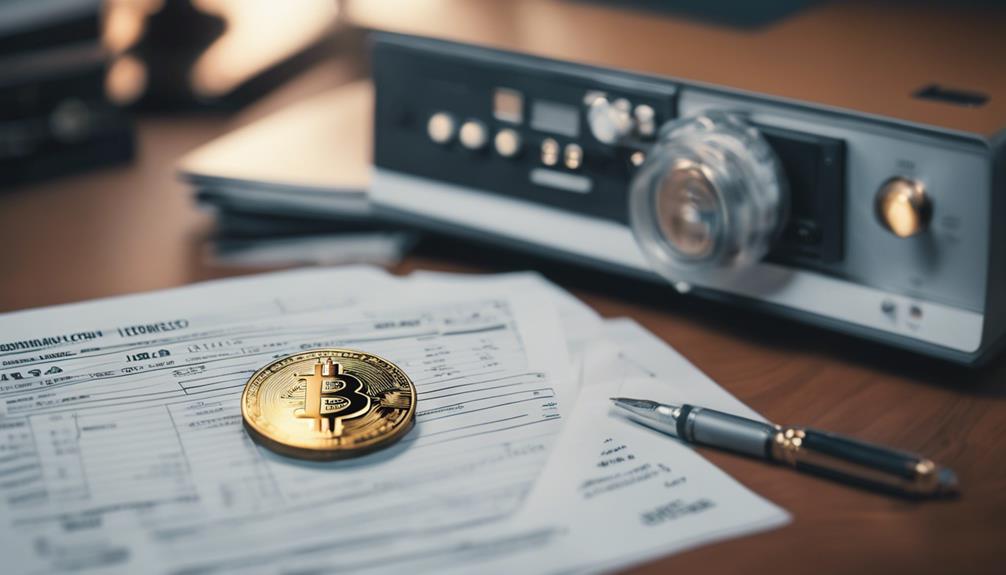
Bitcoin IRAs focus on cryptocurrencies like Bitcoin, Ethereum, and Litecoin, while Traditional IRAs offer stocks, bonds, and mutual funds. Bitcoin IRAs provide diversification and growth potential in the crypto market. Tax-wise, Bitcoin IRAs use after-tax contributions with tax-free withdrawals, unlike Traditional IRAs. They lack required minimum distributions, offering flexibility and potential tax advantages. Bitcoin IRAs involve higher volatility and risk due to crypto market unpredictability. Secure storage in Bitcoin IRAs includes specialized custodians and advanced security measures. Understanding investor profiles, risk tolerance, and long-term goals is important when deciding between the two. Essential differences exist for informed retirement investment decisions.
Key Takeaways
- Bitcoin IRAs offer cryptocurrencies for diversification, while Traditional IRAs focus on stocks and bonds.
- Tax treatment varies: Bitcoin IRAs use after-tax contributions, with tax-free withdrawals, unlike Traditional IRAs.
- Bitcoin IRAs involve higher risk and volatility due to cryptocurrency unpredictability, unlike Traditional IRAs.
- Secure storage in Bitcoin IRAs includes specialized custodians and measures for digital assets, unlike Traditional IRAs.
- Investor profiles differ: younger, risk-tolerant individuals may prefer Bitcoin IRAs, while conservative investors opt for Traditional IRAs.
Asset Options Comparison

When comparing asset options between a Bitcoin IRA and a Traditional IRA, investors encounter distinct choices catering to different investment preferences and goals. Traditional IRAs primarily offer investment options in traditional financial instruments such as stocks, bonds, and mutual funds.
On the other hand, Bitcoin IRAs specialize in digital currencies, providing exposure to cryptocurrencies like Bitcoin, Ethereum, and Litecoin. While Traditional IRAs have a broader array of traditional investment choices, Bitcoin IRAs stand out for their unique inclusion of cryptocurrencies, offering investors a chance to diversify their portfolios beyond conventional assets.
This diversification can be appealing to those seeking exposure to the potential growth opportunities presented by cryptocurrencies while balancing risk through a mix of asset classes. By incorporating Bitcoin, Ethereum, or Litecoin into their retirement accounts, investors can explore alternative investment avenues and potentially benefit from the growth of the cryptocurrency market alongside more traditional investments.
Tax Treatment Variances
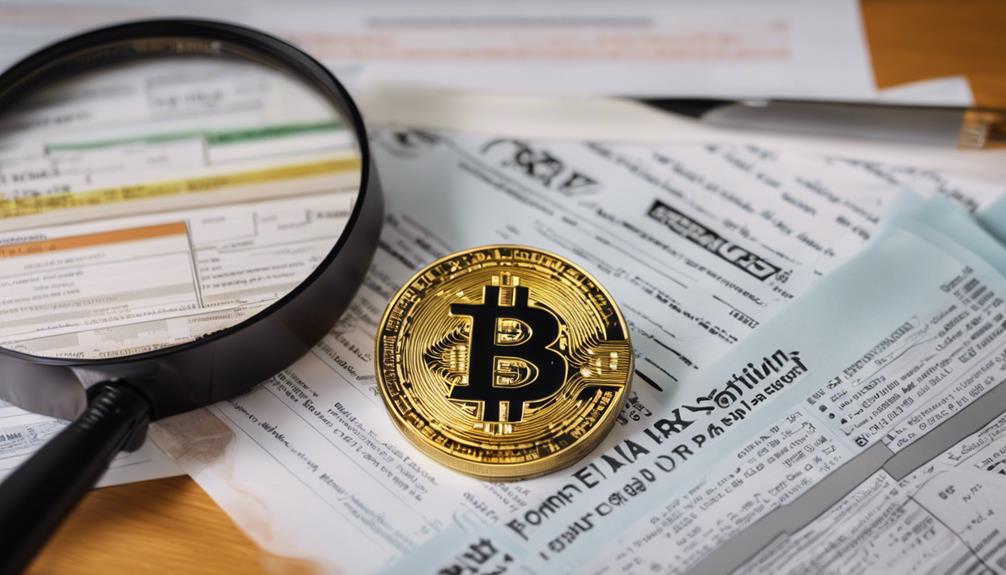
The variance in tax treatment between Bitcoin IRAs and Traditional IRAs presents significant implications for investors' retirement savings strategies. In a Bitcoin IRA, contributions are made with after-tax dollars, while Traditional IRAs use pre-tax dollars. Withdrawals from a Bitcoin IRA are generally tax-free, unlike Traditional IRAs where withdrawals are subject to income tax.
Additionally, Bitcoin IRAs do not have required minimum distributions, offering more flexibility compared to Traditional IRAs which mandate distributions starting at age 72 (or 73 from 2023). The growth within a Bitcoin IRA is not subject to income tax, potentially providing tax advantages over Traditional IRAs.
It is important for investors to take into account these tax implications when deciding between a Bitcoin IRA and a Traditional IRA, as the choice can have significant consequences on their retirement savings and overall financial plan. Understanding the tax treatment differences can help individuals make informed decisions tailored to their specific financial goals.
Risk and Volatility Contrasts

Investors seeking to diversify their retirement portfolios may encounter stark differences in risk and volatility levels between Bitcoin IRAs and traditional IRAs.
Bitcoin IRAs, involving cryptocurrencies, are known for their higher volatility and risk due to the unpredictable nature of digital assets. In contrast, traditional IRAs offer a more stable investment option with lower risk and volatility.
The fluctuating prices of cryptocurrencies in Bitcoin IRAs can lead to significant gains or losses, unlike the relatively stable returns of traditional IRAs. Investors considering Bitcoin IRAs should be prepared for rapid price fluctuations and market uncertainty, which can impact their retirement savings.
While traditional IRAs provide more predictability and stability in returns, Bitcoin IRAs present the potential for higher growth alongside increased risk and volatility. Understanding these distinctions is essential for investors looking to make informed decisions about their retirement savings and the level of risk they are willing to undertake.
Security and Storage Variances

Given the differing risk and volatility levels between Bitcoin IRAs and traditional IRAs, a notable divergence emerges with respect to security and storage approaches. Bitcoin IRAs employ specialized custodians to provide secure storage solutions for digital assets such as Bitcoin, Ethereum, and Litecoin. On the other hand, traditional IRAs typically invest in financial assets like stocks and bonds, relying on financial institutions for custody of these traditional investment assets.
| Bitcoin IRAs | Traditional IRAs |
|---|---|
| Secure storage for digital assets | Custody of traditional investment assets |
| Multi-signature wallets | Invest in financial assets like stocks and bonds |
| Cold storage solutions | Rely on financial institutions for custody |
Security measures in Bitcoin IRAs, including multi-signature wallets and cold storage solutions, aim to protect digital assets from potential cyber threats. Understanding the differences in secure storage practices between Bitcoin IRAs and traditional IRAs is vital for individuals considering the appropriate investment strategy for their retirement funds.
Investor Profile Considerations
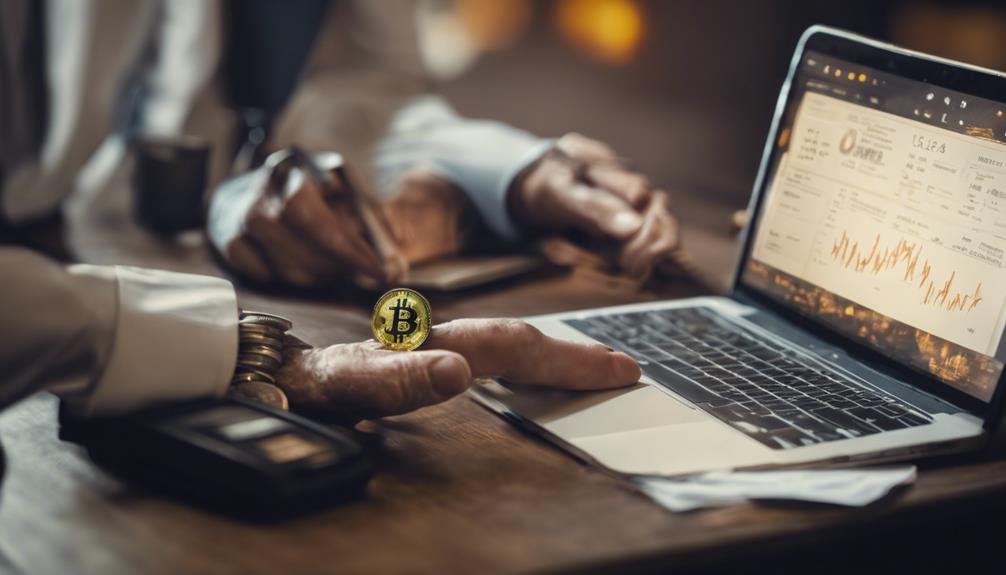
Considering the factors of investor age, risk tolerance, and retirement objectives, the choice between a Bitcoin IRA and a Traditional IRA is greatly influenced.
- Younger investors seeking high growth potential and diversification may find Bitcoin IRAs appealing.
- Conservative investors looking for stable, government-backed investments often opt for Traditional IRAs.
- Risk-tolerant individuals may lean towards Bitcoin IRAs due to the volatile nature of cryptocurrency and the potential for high returns.
When deciding between the two IRAs, it is essential to assess your retirement timeline, income level, and comfort with cryptocurrency risks. Bitcoin IRAs offer the potential for rapid growth but come with increased volatility, while Traditional IRAs provide stability and security.
Understanding your risk tolerance and long-term retirement goals will help determine which IRA aligns best with your investment strategy.
Frequently Asked Questions
What Is a Key Difference in Roth and Traditional Iras?
A key difference between Roth and Traditional IRAs lies in the tax treatment. Roth IRAs involve after-tax contributions with tax-free withdrawals in retirement, while Traditional IRAs use pre-tax dollars and are subject to income tax upon withdrawal.
Additionally, Roth IRAs do not have required minimum distributions, which Traditional IRAs mandate starting at age 72. These distinctions are vital in determining the most suitable retirement savings vehicle based on individual financial circumstances and goals.
What Are the Benefits of a Bitcoin Ira?
Investing in a Bitcoin IRA offers diversification by including cryptocurrencies like Bitcoin, Ethereum, and Litecoin in retirement portfolios. Potential for higher returns exists due to the volatile nature of cryptocurrencies.
Tax advantages, akin to traditional IRAs, provide potential tax benefits for investors. Investors have control over their investments in Bitcoin IRAs, allowing strategic decision-making.
Secure storage solutions guarantee protection against cyber threats and theft, making Bitcoin IRAs a compelling option for retirement planning.
What Is the Difference Between a Simple IRA and a Roth Ira?
A Simple IRA and a Roth IRA differ primarily in their tax treatment and contribution structure.
A Simple IRA allows for tax-deductible employer contributions and pre-tax employee contributions, akin to a Traditional IRA.
In contrast, a Roth IRA requires after-tax contributions but offers tax-free withdrawals in retirement.
Roth IRAs have income eligibility limits, making them more restrictive compared to Simple IRAs, which are accessible to small business owners and employees.
Understanding these distinctions is vital for retirement planning.
What Are the Pros and Cons of a Roth Ira?
When assessing a Roth IRA, it's crucial to take into account its tax benefits.
While contributions don't offer immediate tax deductions, withdrawals are generally tax-free, providing tax-free growth within the account.
Roth IRAs also lack required minimum distributions, offering flexibility in managing retirement funds.
Ideal for those expecting similar or higher taxable income in retirement, a Roth IRA locks in the current tax rate for tax-free growth, potentially resulting in larger inheritances.
Conclusion
In comparing Bitcoin IRA and Traditional IRA, it is clear that they offer different asset options, tax treatments, risks, and storage methods. Investors must carefully consider their profile and goals before choosing between them.
The irony lies in the fact that while Bitcoin IRA may seem more volatile and risky, it also has the potential for higher returns, making it an intriguing option for those willing to take the chance. Ultimately, the decision depends on individual preferences and risk tolerance.
Albert brings a wealth of knowledge and expertise to our writing team. With a background in caregiving and a deep understanding of the challenges faced by caregivers, Albert’s writing resonates with authenticity and empathy. He is committed to delivering high-quality content that empowers and supports caregivers on their journey.
IRA Investing
How to Ensure the Safety of Your Bitcoin IRA
Protect your Bitcoin IRA with advanced security measures and expert guidance to safeguard your retirement investments.
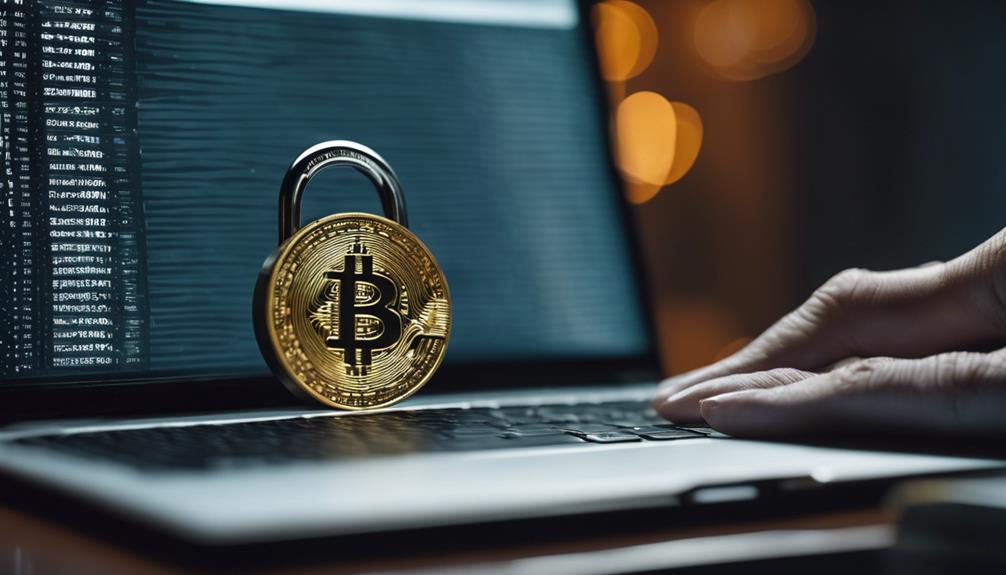
To safeguard the safety of your Bitcoin IRA, choose reputable custodial services offering advanced security measures like cold-storage wallets and multi-signature technology. Stay informed about security risks in the cryptocurrency space and monitor account activity diligently. Educate yourself on best practices and consider consulting financial professionals for guidance. Implementing multi-factor authentication and staying updated on security protocols are vital steps. Diversifying your portfolio and understanding tax efficiency are also important for long-term planning. By incorporating these safety measures, you can protect your Bitcoin IRA investments effectively. Learn more about optimizing security and diversification strategies to safeguard your retirement funds.
Key Takeaways
- Choose reputable custodial services with advanced security measures.
- Utilize multi-signature solutions for transaction authorization.
- Stay informed on security risks and best practices.
- Monitor account activity closely for any irregularities.
- Educate on secure storage, multi-factor authentication, and cyber threats.
Choosing a Reputable Custodial Service
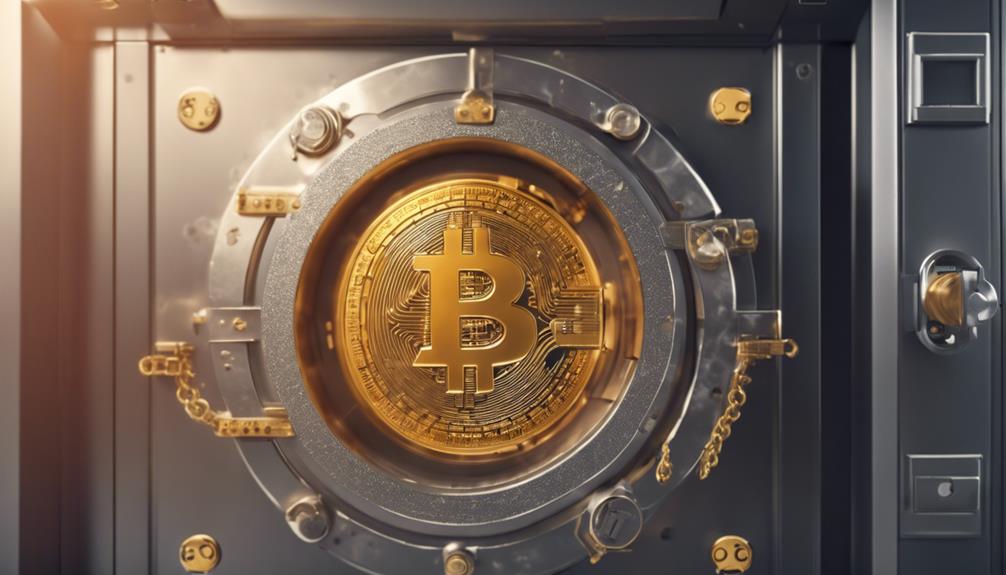
When safeguarding your Bitcoin IRA, selecting a custodial service renowned for its robust security measures is paramount. BitGo is a leading choice for custodial services, offering industry-leading security features such as SOC 2 Type 2 Certification. This certification guarantees that your Bitcoin IRA storage meets stringent data security standards.
Additionally, reputable custodial services like BitGo provide digital asset insurance through trusted providers like Lloyds of London, adding an extra layer of protection for your investments. Cold-storage wallets are utilized by these custodial services to securely store your Bitcoin IRA offline, reducing the risk of cyber threats.
Moreover, the implementation of multi-signature technology by these services enhances the safety of your Bitcoin IRA holdings by requiring multiple approvals for transactions. By entrusting your Bitcoin IRA to a custodial service like BitGo with these advanced security measures in place, you can have peace of mind knowing that your investments are well-protected.
Implementing Multi-Signature Solutions
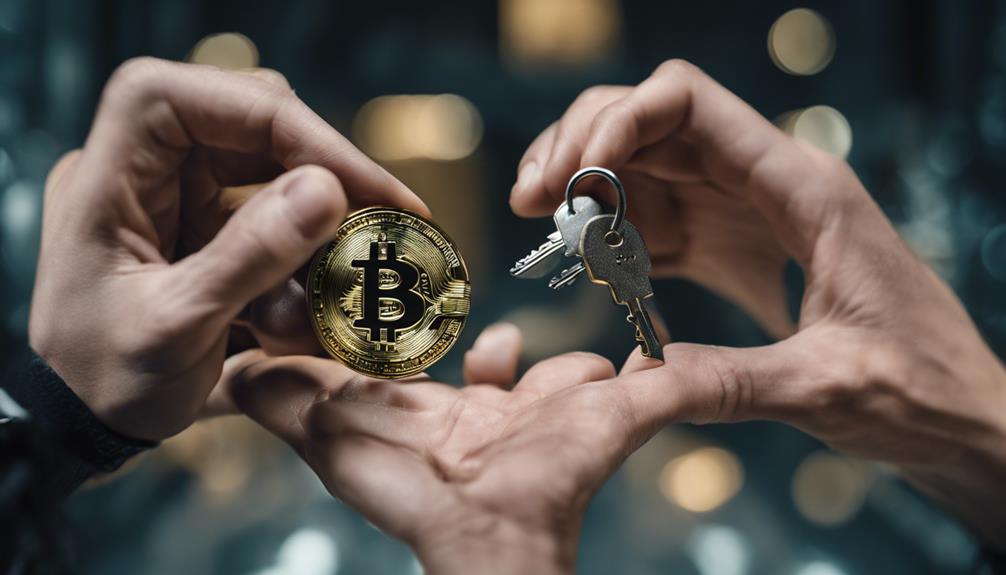
How can implementing multi-signature solutions enhance the security of your Bitcoin IRA storage?
Multi-signature solutions require multiple private keys to authorize transactions, offering increased security measures. With this setup, each key holder must approve a transaction, greatly reducing the risk of unauthorized access to your Bitcoin IRA.
Unchained IRA, a provider specializing in cryptocurrency retirement accounts, offers a multi-signature option for Bitcoin storage, adding an extra layer of protection to your investments. These multi-sig setups can involve 2-of-3 or more key holders, further strengthening the security of your funds.
Staying Informed About Security Risks

To effectively protect your Bitcoin IRA, staying informed about security risks is essential for safeguarding your digital assets. As the value of cryptocurrency continues to rise, so do the risks associated with cyber threats and phishing scams.
It's vital to understand the vulnerabilities involved in storing cryptocurrency, especially in retirement accounts like a Bitcoin IRA. Educating yourself on the best practices for protecting digital assets is key to mitigating these risks. By staying updated on security protocols and being aware of potential threats, you can take proactive measures to secure your Bitcoin IRA.
Being vigilant in monitoring your account activity and staying informed about the latest trends in cryptocurrency security will help you stay ahead of potential risks. Regularly reviewing updates and news related to cybersecurity in the cryptocurrency space will enable you to make informed decisions about safeguarding your investments.
Regularly Reviewing Account Activity
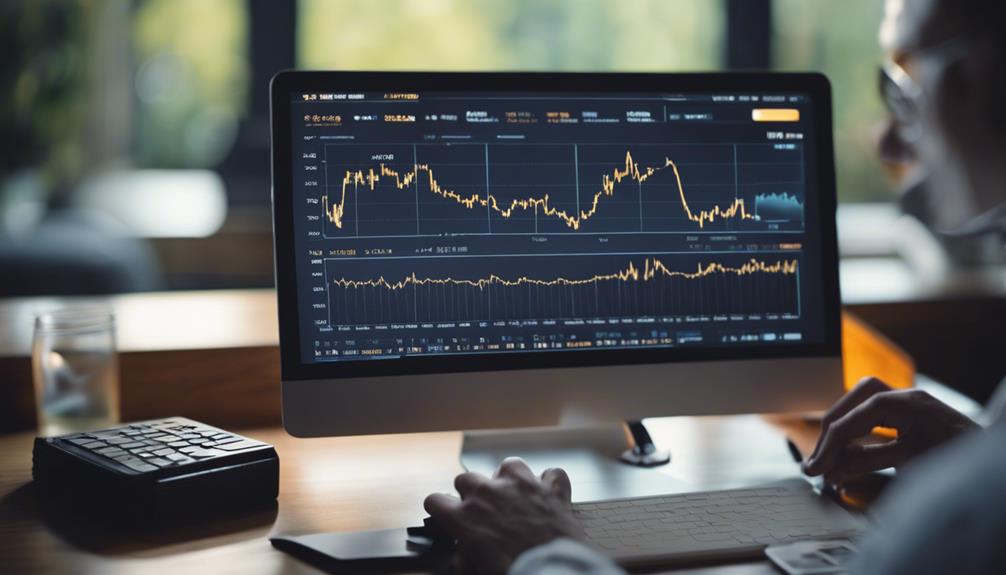
Regularly reviewing your Bitcoin IRA account activity is essential for maintaining its security and integrity. By monitoring transactions closely, setting up alerts, and verifying login details, you can stay proactive in safeguarding your investments.
This practice helps you identify any unusual activity early on and guarantees that your assets are protected.
Monitor Transactions Closely
Vigilantly reviewing account activity is crucial in safeguarding the integrity and security of your Bitcoin IRA. Monitoring transactions closely allows you to detect unauthorized transactions and promptly identify any suspicious or fraudulent activity.
By keeping a close eye on your account, you can guarantee that all transactions align with your investment goals and prevent potential security breaches or unauthorized access. This level of scrutiny also enables you to maintain control and security over your Bitcoin IRA holdings.
Regularly reviewing your account activity is a proactive measure that helps you stay informed about the ins and outs of your investments, giving you peace of mind and confidence in the security of your retirement savings.
Set up Alerts
Monitoring your Bitcoin IRA account activity through setting up alerts is a proactive measure that enhances the security of your investments. By staying vigilant and regularly reviewing your account statements, you can detect any irregularities or unauthorized access promptly.
Utilizing two-factor authentication adds an extra layer of security to your account, reducing the risk of unauthorized logins. Stay informed about the latest security measures and best practices to safeguard your Bitcoin IRA effectively.
In case of any suspicious activity, report it immediately to your custodian or financial institution for further investigation and action. Being proactive and attentive to your account activity can help prevent potential security breaches and protect your investments.
- Set up transaction alerts to monitor account activity
- Regularly review account statements
- Utilize two-factor authentication
- Stay informed about security measures
- Report any unusual activity to your custodian or financial institution
Verify Login Details
To enhance the security of your Bitcoin IRA, diligently reviewing your account activity to verify login details is important for detecting any unauthorized access or suspicious behavior. Monitoring your account regularly can help you spot any irregularities and take immediate action to protect your investments. It is essential to make sure that all login details, including usernames and passwords, are secure and not compromised. Setting up two-factor authentication adds an extra layer of security when accessing your Bitcoin IRA. If you notice any unusual activity or login attempts, promptly report them to your custodian or platform for further investigation. Stay proactive in safeguarding your assets by staying vigilant and proactive in monitoring your account.
| Action | Importance | Benefit |
|---|---|---|
| Review account activity | Important | Detect unauthorized access |
| Secure login details | Necessary | Prevent account compromise |
| Report unusual activity | Essential | Protect investments |
Educating Yourself on Best Practices

To safeguard your Bitcoin IRA effectively, it is important to prioritize educating yourself on best practices for secure storage and protection.
- Understand the risks associated with Bitcoin IRAs to make informed decisions.
- Educate yourself on the importance of secure storage solutions for your Bitcoin IRA.
- Learn about the benefits of multi-signature setups for enhancing security.
- Stay informed about the latest security protocols and best practices for Bitcoin IRA protection.
- Take advantage of educational resources provided by reputable custodians to enhance your knowledge.
Consulting With Financial Professionals

When contemplating the safety of your Bitcoin IRA, consulting with financial professionals is essential.
Their expertise can provide valuable insights into the complexities of investing in cryptocurrencies and help you navigate potential risks effectively.
Expert Advice Importance
Seeking guidance from financial professionals is essential in ensuring the safety and effectiveness of your Bitcoin IRA investment strategy.
- Receive tailored expert advice for your Bitcoin IRA
- Navigate complexities with knowledge and experience
- Understand risks and benefits of Bitcoin IRAs
- Optimize investment strategy for long-term financial objectives
- Safeguard and maximize growth while managing risks
Professional Guidance Essential
Engaging with financial professionals is important for guaranteeing the effective management of your Bitcoin IRA investment. Consulting with financial advisors can provide you with personalized guidance on maneuvering the risks and benefits associated with Bitcoin investments within your retirement account.
These professionals can help you make informed decisions that align with your long-term financial goals and risk tolerance. Understanding the complexities of Bitcoin investments is vital, and seeking professional guidance can assist in optimizing your Bitcoin IRA.
Frequently Asked Questions
Is the Bitcoin IRA Safe?
Ensuring the safety and security of Bitcoin IRAs is crucial when secured through reputable custodians utilizing robust security measures like multi-signature setups. Custodial services offer an added layer of protection by not providing direct access to Bitcoin keys. However, exploring alternative security options may be prudent in extreme circumstances.
Staying informed about potential economic and political factors that could impact the safety and viability of Bitcoin IRAs is crucial, highlighting the importance of secure storage solutions.
How Do I Hold Bitcoins in My Ira?
To hold bitcoins in your IRA, first select a custodian supporting cryptocurrency investments. Fund your IRA with Bitcoin purchases through reputable custodians like Bitcoin IRA or BitIRA. Your Bitcoin holdings are typically stored in secure cold storage wallets for added protection.
Custodians guarantee compliance with IRS regulations for Bitcoin in retirement accounts, safeguarding your investments. Partnering with trustworthy custodians is key to securely holding bitcoins in your IRA.
Is Itrustcapital Fdic Insured?
Itrustcapital is not FDIC insured, as it is a cryptocurrency custodial service. FDIC insurance, typically associated with traditional bank accounts, does not extend to cryptocurrency holdings due to their digital nature.
While the lack of FDIC insurance is common among cryptocurrency custodians, Itrustcapital implements stringent security measures such as multi-signature wallets to protect clients' assets.
It is important for individuals to research and understand the security protocols of custodial services like Itrustcapital to make well-informed decisions regarding their investments.
Can I Withdraw Bitcoin From Bitcoin Ira?
Yes, you can withdraw Bitcoin from your Bitcoin IRA. Withdrawals are subject to IRS regulations and penalties if not executed correctly. Consult your custodian or financial advisor for guidance on Bitcoin IRA withdrawals.
Proper documentation and reporting may be necessary for Bitcoin withdrawals from your IRA. Withdrawals can be made in Bitcoin or converted to fiat currency based on your preferences and requirements.
Conclusion
To sum up, safeguarding your Bitcoin IRA requires diligence and caution. By selecting a reputable custodial service, utilizing multi-signature solutions, staying informed about security risks, reviewing account activity regularly, and educating yourself on best practices, you can help protect your investment.
Consulting with financial professionals can also provide valuable guidance. By following these steps, you can enhance the safety of your Bitcoin IRA and potentially secure a more stable financial future for retirement.
Albert brings a wealth of knowledge and expertise to our writing team. With a background in caregiving and a deep understanding of the challenges faced by caregivers, Albert’s writing resonates with authenticity and empathy. He is committed to delivering high-quality content that empowers and supports caregivers on their journey.
IRA Investing
Pros and Cons of Investing in a Bitcoin IRA
Leverage the potential benefits and pitfalls of a Bitcoin IRA to make informed decisions for your retirement portfolio.

Investing in a Bitcoin IRA provides diversification beyond typical investments, potentially enhancing returns and shielding from capital gains taxes. Its growth potential and tax advantages can boost long-term financial security. However, risks include market volatility, fees, and regulatory uncertainties that may affect retirement savings. Carefully analyzing fees and suitability is essential. Overall, Bitcoin IRAs offer a mix of advantages and risks that can impact retirement planning greatly. Consider all factors to align with your investment goals and strategy for a secure financial future. Explore the opportunities and drawbacks to make informed decisions about your retirement investments.
Key Takeaways
- Tax benefits shield capital gains in Bitcoin IRAs.
- Diversification beyond traditional assets reduces risk exposure.
- Market volatility can impact retirement savings in Bitcoin IRAs.
- High fees for setup, maintenance, and trading affect potential gains.
- Regulatory uncertainty poses challenges for Bitcoin IRA investors.
Advantages of Bitcoin IRAs

Investing in a Bitcoin IRA offers a host of strategic advantages that can bolster financial portfolios and retirement planning. By utilizing a self-directed IRA to hold digital assets like Bitcoin, investors can benefit from diversification beyond traditional securities. This diversification can help spread risk and potentially enhance returns over the long term.
One key advantage is the tax benefits associated with Bitcoin IRAs. Investors can avoid capital gains taxes by conducting buy and sell transactions within the IRA, allowing for more efficient growth of assets. Additionally, holding Bitcoin within an IRA provides a level of protection against market volatility, safeguarding retirement savings from sudden price swings.
The compounding growth potential within a Bitcoin IRA is also significant, as the tax advantages can lead to enhanced long-term financial outcomes. Overall, investing in a Bitcoin IRA can offer unique advantages for those looking to secure their financial future through strategic and tax-efficient investment decisions.
Potential Growth Opportunities

Given the potential for significant growth opportunities within Bitcoin IRAs, investors can tap into the high growth potential of the cryptocurrency market and potentially outperform traditional assets. Here are three key points to ponder when exploring potential growth opportunities:
- Historical Performance: Bitcoin IRAs offer the chance to benefit from the historical performance of Bitcoin as a digital asset. The value of Bitcoin has shown remarkable growth over the years, making it an appealing option for retirement savings within a Bitcoin IRA.
- Financial Diversification: Investing in a Bitcoin IRA allows for diversification of funds into digital assets, providing exposure to the high growth potential of the cryptocurrency market. By diversifying retirement savings beyond traditional assets, investors can potentially enhance their overall portfolio performance.
- Future Growth Prospects: With a Bitcoin IRA, investors can capitalize on the long-term growth prospects of Bitcoin in the financial market. The increasing adoption and acceptance of Bitcoin offer the opportunity for exponential growth in retirement savings, positioning Bitcoin IRAs as a potential avenue for significant wealth accumulation.
Tax Benefits and Advantages
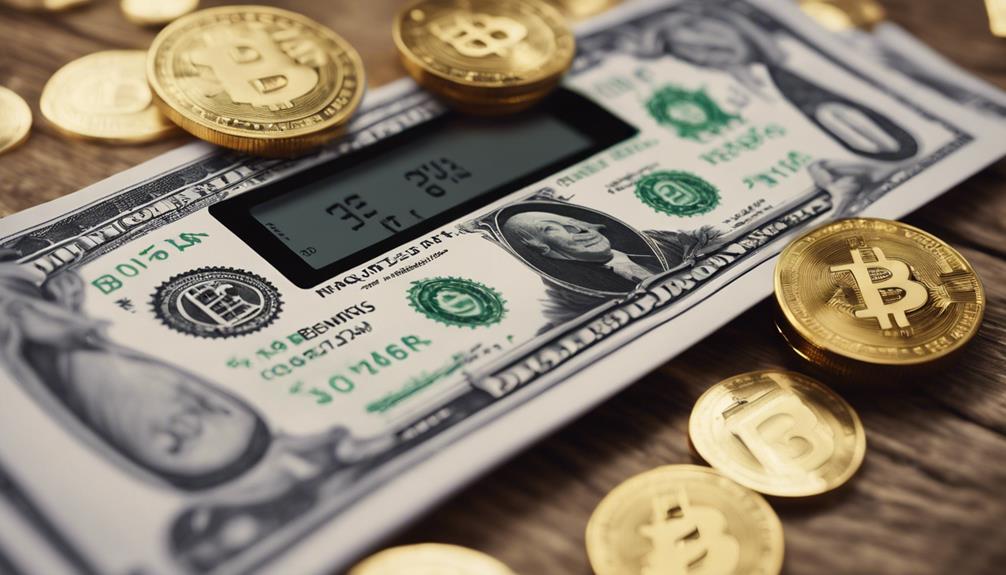
Bitcoin IRAs offer a variety of tax benefits and advantages that can greatly impact investors' long-term financial strategies. Investing in a Cryptocurrency IRA can provide tax advantages by shielding capital gains from taxation.
Roth Bitcoin IRAs specifically offer tax-free withdrawals in retirement, enhancing long-term savings benefits. Additionally, utilizing a Bitcoin IRA allows for staking opportunities, enabling investors to earn interest without tax concerns.
These tax benefits mirror those of traditional Roth IRAs, optimizing investment returns and helping investors grow their retirement savings efficiently. By taking advantage of the tax benefits of Roth crypto IRAs, investors can strategically position themselves for long-term financial stability.
This unique investment avenue not only offers potential growth opportunities but also provides a tax-efficient way to save for retirement, making it an attractive option for individuals looking to diversify their portfolios while maximizing tax advantages.
Portfolio Diversification Benefits

Enhancing investment resilience through strategic asset allocation is a key advantage of including a Bitcoin IRA in a diversified portfolio. This form of portfolio diversification offers several benefits:
- Reduced Risk Exposure: By adding a non-correlated asset like Bitcoin to traditional investments, investors can spread their risk across different asset classes. This diversification can help in balancing the overall risk exposure in the portfolio.
- Enhanced Investment Returns: Portfolio diversification through a Bitcoin IRA can potentially lead to higher long-term investment returns. This strategy allows investors to capture gains from various market movements, thereby boosting overall returns.
- Growth Potential and Risk Mitigation: Including Bitcoin in an IRA provides the opportunity to benefit from the growth potential of the cryptocurrency market while mitigating risks associated with traditional investments. Bitcoin's low correlation with assets like stocks and bonds can aid in diversifying and strengthening the portfolio, potentially leading to improved performance over time.
Risks Associated With Bitcoin IRAS

Bitcoin IRAs come with inherent risks such as market volatility, which can greatly impact retirement savings. Additionally, high fees for setup, maintenance, trading, and custody can eat into potential gains.
Investors should also be aware of contribution cap limits that may hinder their ability to maximize their investments in Bitcoin IRAs.
Volatility in Bitcoin
The dynamic nature of the cryptocurrency market presents a significant challenge for investors contemplating Bitcoin IRAs. When it comes to volatility in Bitcoin, there are several key points to bear in mind:
- Price volatility can lead to significant fluctuations in the value of a Bitcoin IRA.
- The unpredictable nature of Bitcoin's price movements increases the risk of sudden losses in Bitcoin IRAs.
- Market volatility can have a substantial impact on retirement funds held in Bitcoin IRAs.
Managing risk and understanding the price swings in Bitcoin are essential aspects to take into account when investing in a Bitcoin IRA. Being aware of these factors can help investors navigate the uncertainties associated with cryptocurrency investments and make informed decisions for their retirement savings.
Regulatory Uncertainty
Traversing the terrain of Bitcoin IRAs can be further complicated by regulatory uncertainty stemming from the evolving guidelines surrounding cryptocurrency investments in retirement accounts. The lack of clear IRS guidelines on how to handle cryptocurrencies within retirement funds adds to the complexity.
Custodians of Bitcoin IRAs face fiduciary responsibilities and compliance requirements, contributing to the regulatory ambiguity investors encounter. Potential regulatory risks include changes in tax laws, reporting requirements, and government oversight, all of which can impact the viability of Bitcoin IRAs.
To navigate these challenges, investors must stay informed about regulatory developments, ensuring they remain compliant and mitigate associated risks. Keeping abreast of evolving regulations and seeking professional advice can help investors make informed decisions when considering Bitcoin IRAs for their retirement portfolios.
Volatility and Market Fluctuations

Traversing the landscape of Bitcoin IRAs requires a keen awareness of the inherent volatility and market fluctuations characteristic of the cryptocurrency space. Investors must understand the potential risks associated with investing retirement savings in a Bitcoin IRA due to the fluctuating nature of the cryptocurrency market.
Here are three key points to ponder:
- Price Swings: The value of Bitcoin held in a Bitcoin IRA can experience significant price swings in a short period, impacting the overall value of the investment.
- Market Fluctuations: Fluctuations in the cryptocurrency market can directly affect the retirement savings held in a Bitcoin IRA, leading to uncertainties in the long-term value of the investment.
- Price Volatility: The high volatility of Bitcoin introduces risks that investors should be prepared for, as the value of a Bitcoin IRA may fluctuate unpredictably over time.
Being mindful of these factors and staying informed about market trends can help investors navigate the challenges posed by volatility and market fluctuations when contemplating a Bitcoin IRA.
Fees and Expenses to Consider
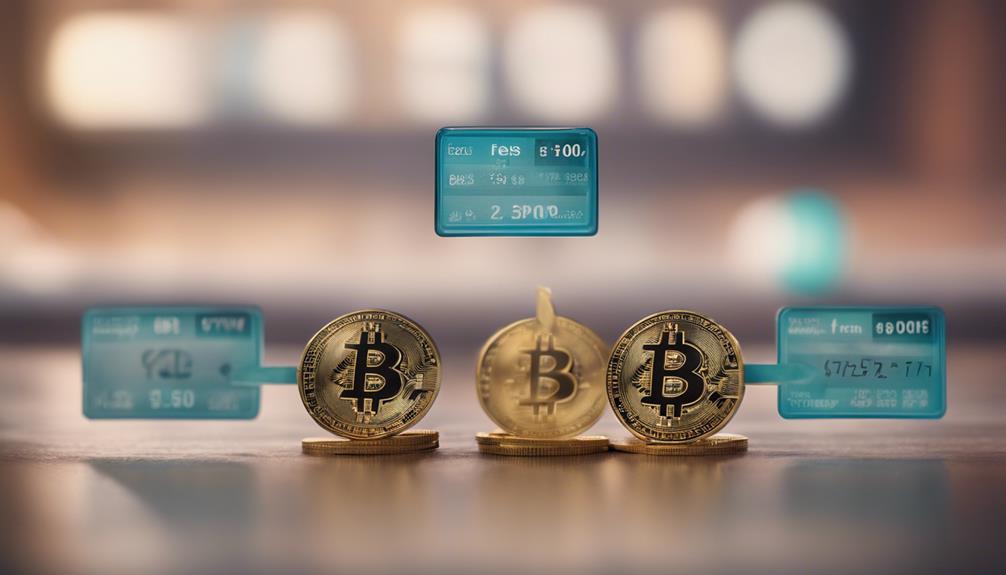
Exploring the world of Bitcoin IRAs requires a fundamental understanding of the various fees and expenses that come into play when considering this investment option. Cryptocurrency IRA fees encompass setup fees, transaction fees, and annual maintenance fees.
Additionally, custodial fees for secure storage of Bitcoin in an IRA and trading fees for buying and selling Bitcoin within the account can contribute to overall Bitcoin IRA expenses. These fees can vary among different custodians and may have an impact on investment returns.
It is essential for investors to comprehend and compare the fees associated with Bitcoin IRAs to make informed decisions. By analyzing the fee structures of different providers and understanding how these fees can affect returns, individuals can better assess the viability of investing in a Bitcoin IRA.
Careful consideration of fees and expenses is vital for maximizing the potential benefits of a Bitcoin IRA and achieving long-term financial goals.
Evaluating Bitcoin IRA Suitability
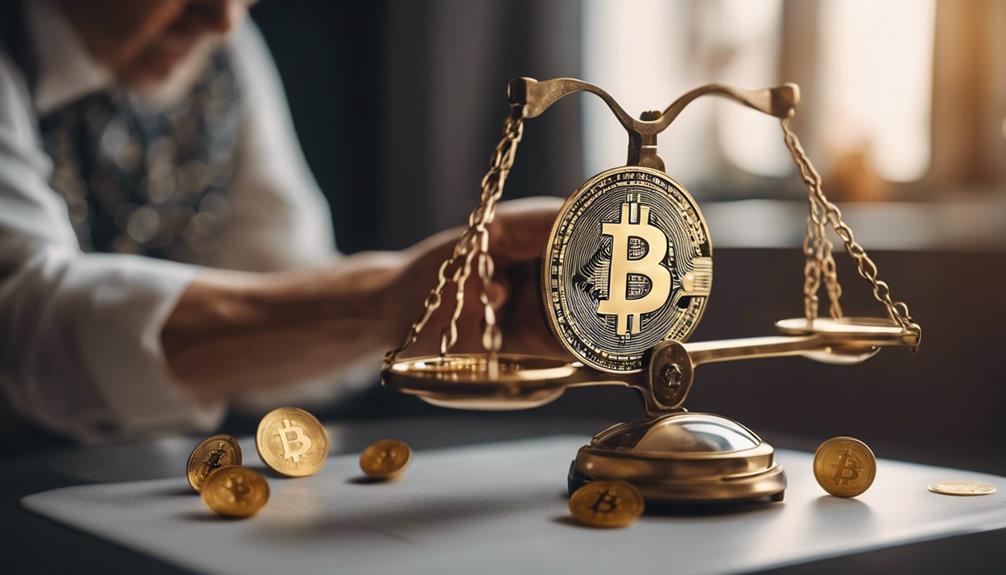
Evaluating the suitability of a Bitcoin IRA for one's financial goals and retirement strategy is an important step in the investment decision-making process. Consider the following points to determine if a Bitcoin IRA aligns with your investment objectives:
- Tax Advantages: Bitcoin IRAs offer tax benefits by enabling investments in Bitcoin within a retirement account, potentially reducing tax liabilities and maximizing returns.
- Diversification Benefits: Holding Bitcoin in an IRA can provide diversification benefits to traditional investment portfolios, spreading risk and enhancing overall portfolio resilience.
- Capital Gains Tax Efficiency: Investing in a Bitcoin IRA can shield capital gains from taxation, allowing for the potential growth of investments in Bitcoin without immediate tax implications. This can lead to significant growth over time as returns compound, bolstering your retirement savings.
Frequently Asked Questions
Is It a Good Idea to Have a Bitcoin Ira?
Investing in a Bitcoin IRA can be a strategic move for some investors. Given the potential for high returns and diversification benefits, it may offer an opportunity to enhance retirement portfolios.
However, it's important to carefully assess the risks and volatility associated with cryptocurrencies. Understanding tax implications and the differences between traditional and Roth Bitcoin IRAs is essential for informed decision-making.
Seeking professional advice can help navigate the complexities of Bitcoin IRAs effectively.
Can I Withdraw Bitcoin From Bitcoin Ira?
In a Bitcoin IRA, you cannot directly withdraw Bitcoin as physical assets. Typically, withdrawals are in cash equivalent to the current Bitcoin value. The primary goal of a Bitcoin IRA is long-term retirement investment, not immediate access to cryptocurrency.
Selling Bitcoin within the IRA may trigger capital gains taxes or penalties, contingent on the IRA type and account age. Consult with your IRA custodian or financial advisor to grasp the specific rules and implications of withdrawing funds from a Bitcoin IRA.
Do You Pay Taxes on Bitcoin Ira?
In a Bitcoin IRA, taxes are typically deferred until withdrawals are made during retirement, akin to traditional IRAs. Roth Bitcoin IRAs, on the other hand, allow for tax-free withdrawals post-retirement, making them advantageous for long-term investors.
Capital gains taxes do not apply when purchasing or selling Bitcoin within a self-directed IRA. Contributions to a Bitcoin IRA may also be tax-deductible, reducing taxable income in the year of contribution.
How Much Does Bitcoin IRA Charge?
Bitcoin IRA charges an average setup fee of $50 to $100, with annual maintenance fees ranging from $100 to $300.
Transaction fees for buying and selling Bitcoin in an IRA can be between 1% to 2%, while custodial fees for holding Bitcoin typically range from 0.5% to 1% annually.
In total, fees for a Bitcoin IRA can add up to approximately 10% of the investment amount over a 10-year period.
Conclusion
To sum up, contemplating investing in a Bitcoin IRA can provide potential growth opportunities, tax benefits, and portfolio diversification. However, it also comes with risks such as volatility and fees to ponder.
It is important to assess the suitability of a Bitcoin IRA based on individual financial goals and risk tolerance. According to a recent survey, 42% of Americans are contemplating including cryptocurrencies in their retirement portfolios, highlighting the growing interest in alternative investment options for retirement savings.
Albert brings a wealth of knowledge and expertise to our writing team. With a background in caregiving and a deep understanding of the challenges faced by caregivers, Albert’s writing resonates with authenticity and empathy. He is committed to delivering high-quality content that empowers and supports caregivers on their journey.
-

 Dementia Care2 weeks ago
Dementia Care2 weeks agoHow Gabapentin Affects Dementia: A Comprehensive Guide
-

 Dementia Care2 months ago
Dementia Care2 months agoUnderstanding the Stages of Vascular Dementia: A Visual Chart Guide
-

 Dementia Care2 weeks ago
Dementia Care2 weeks ago5 Things You Need to Know About Jack Nicholson’s Dementia
-

 Medication Management1 month ago
Medication Management1 month agoGabapentin Side Effects: Memory Loss Concerns?
-

 Dementia Care2 months ago
Dementia Care2 months agoUnderstanding Narcissism and Dementia: A How-To Guide
-

 Palliative Care for Parkinson's2 weeks ago
Palliative Care for Parkinson's2 weeks agoPalliative Care for Parkinson’s: A New Hope for Patients”
-

 Dementia Care2 weeks ago
Dementia Care2 weeks ago10 Engaging Dementia Games for Cognitive Stimulation
-

 Dementia Care2 months ago
Dementia Care2 months agoHow to Deal with a Parent’s Dementia: A Practical Guide

















